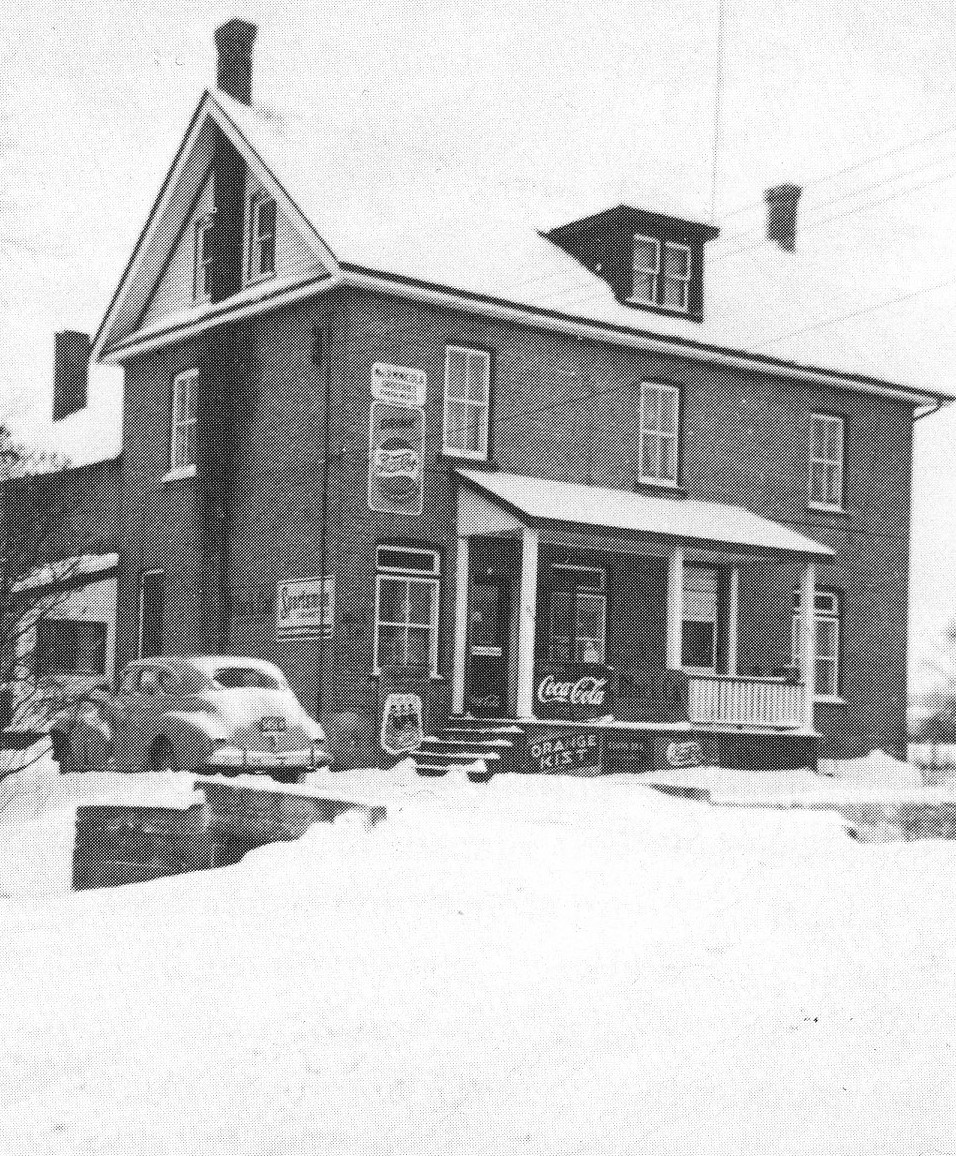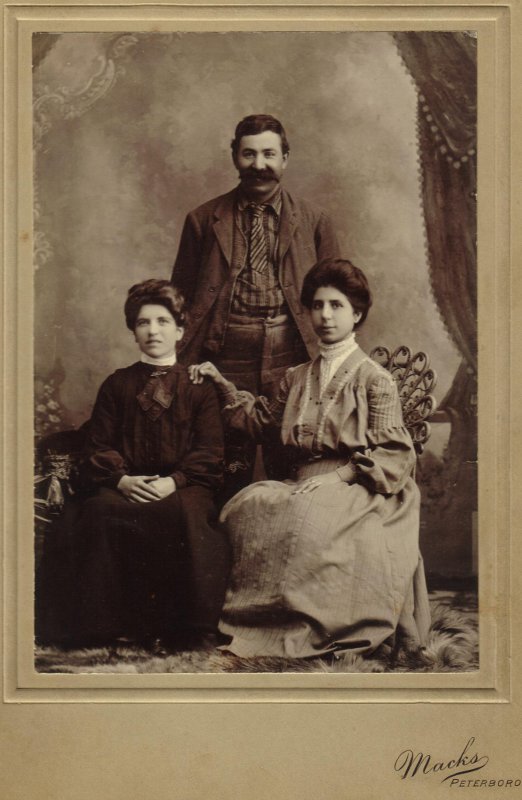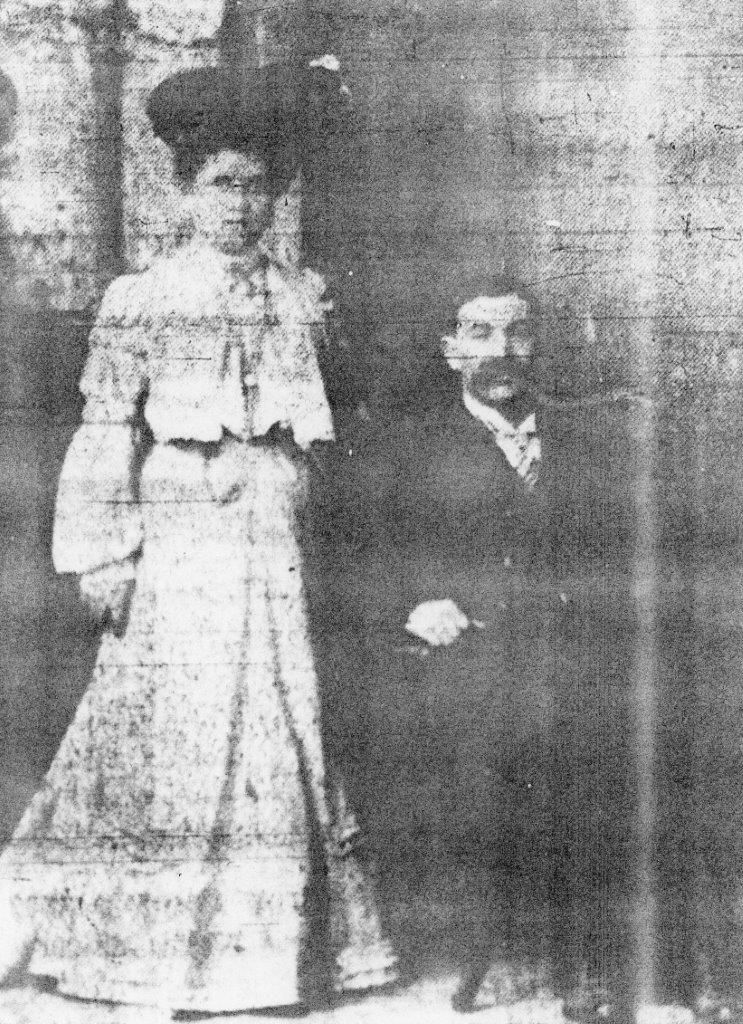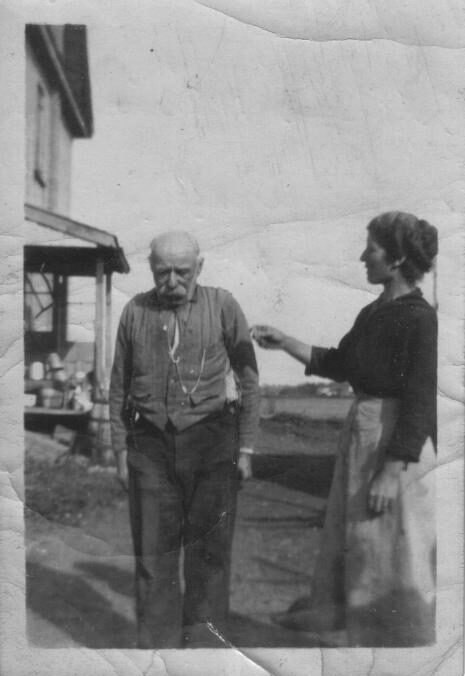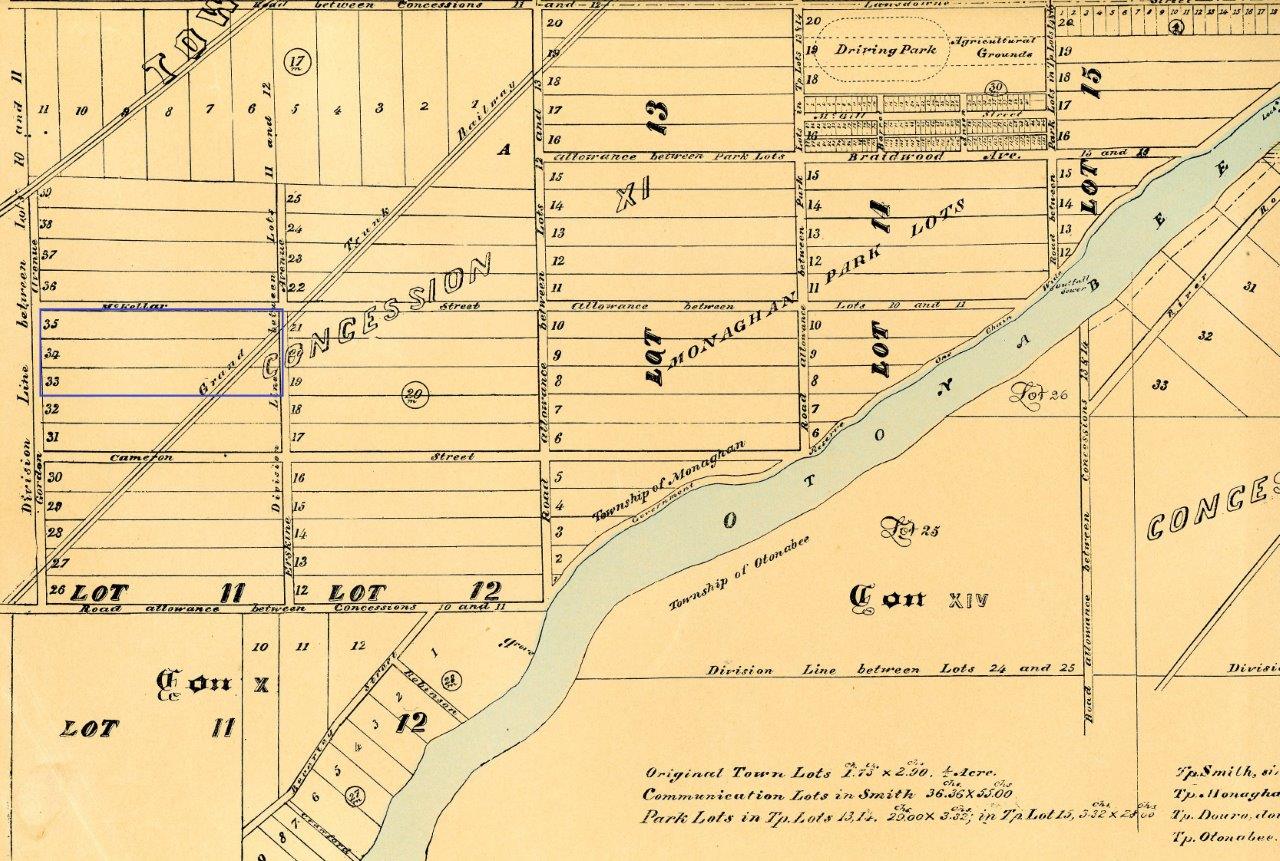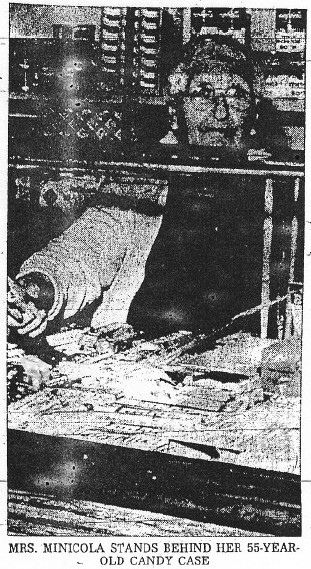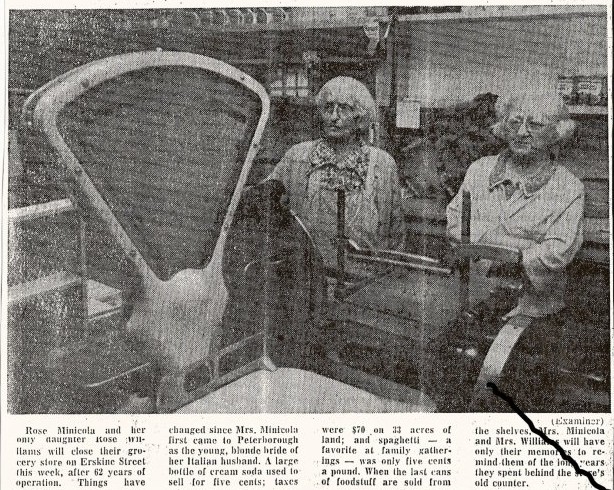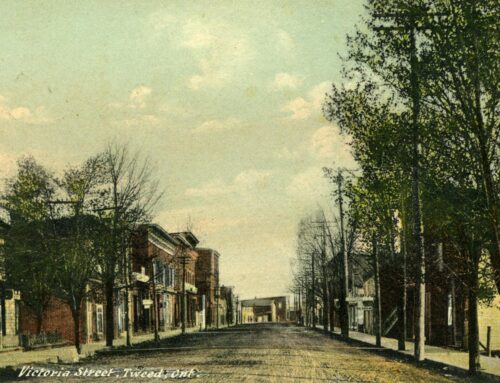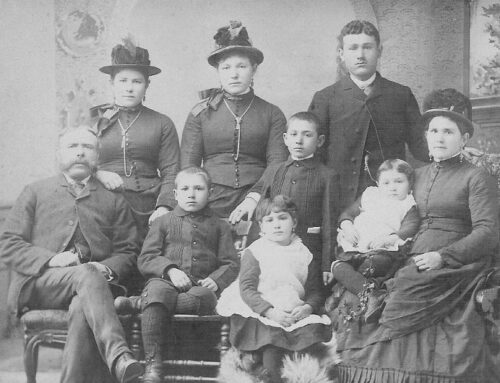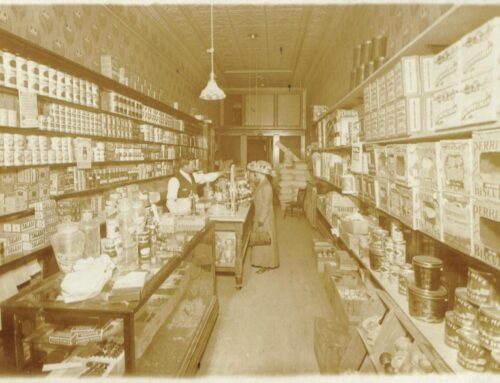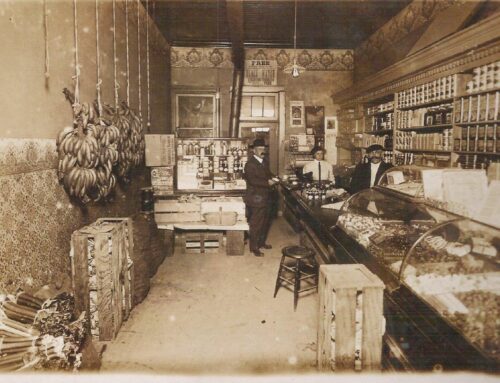| Owner/Proprieters | Leonardo & Rose Minicola & daughter Rose Williams |
| Years active | 1912 – 1975 |
| Location |
635 Erskine Ave |
Leonardo and Rosaria Minicola’s store was located at what is now 635 Erskine Ave. Leonardo’s father Filipo Minicola had owned land in that area as early as 1899. At this time the property was actually farm land in North Monaghan township. Between 1948 and 1956 the area was annexed by the City of Peterborough.
Peterborough County land records show that there were 3 lots of 11 acres each purchased by Leonardo Minicola between the 4th of July, 1905 and September 21st, 1906. Lots 33, 34 and 35 of Plan 34Q were purchased for $500, $600 and $1150 respectively. The first reference we have of Leonardo and his family living at this property is from the 1911 Canadian Census. Leonardo, his wife Rosaria and their daughter Rosena (Rose) are listed along with Rosaria’s sister Carmella Luisi. Leonardo’s occupation is listed as being a Gardener with no mention made of him being a grocer or there being a store on the property. Leonardo was known as a gardener or a market gardener meaning he grew fruit and vegetables for resale.
According to articles published in the Examiner during Rosaria’s later years she states the store opened in 1912. The first listing for the store in the Peterborough directory shows up in 1917. Apparently Leonardo built an addition to the back of their home to house the store.
Right: Minicola’s store at what is now 635 Erskine Avenue about 1950
Leonardo’s grandson Leonard Williams explains that Leonardo and some friends built the large brick home and for many years the Minicolas were market gardeners who grew all their own vegetables. Twice a week, Wednesday and Saturday, Leonardo would load up the wagon with vegetables, hitch up the horse and make his usual rounds throughout the south-end of town. Rose would look after the store, along with the chickens, the garden, the milking, you name it!
There were a lot of little chits (unpaid accounts) in the store for groceries that went unpaid but it did not bother Rose. Her favourite saying was “Hang-it, people have to eat”. A lot of friends and family never went home empty-handed from the farm or store. They were very generous people.
Leonardo Minicola died very suddenly in August, 1943. He had returned from his delivery rounds, unhooked the horse, stabled and fed him. Entering the house he lay down to rest and died peacefully.
Soon after his death Rosaria’s daughter Rose, her husband Tom Williams and their four children, Rose Marie, Leonard, Gladys and Gloria moved to the farm.”
In March 1950 most of the 33 acres of farm land was sold to the city of Peterborough for $12,000. This included all of the land west of the railway tracks. Rosaria and family retained the home/store and the land east of the railway tracks, maybe an acre or two.
In January of 1975 Rosaria at the age of 90 was no longer well enough to run the store. Daughter Rose Williams, herself 70 years old at the time could not run it on her own. After 62 years the store was closed for good. Rosaria passed away in April of 1978 at the age of 94.
Above: North Monaghan map circa 1896 showing Minicola farm at middle left in blue lots 33, 34 and 35. Lansdowne street runs along the top of the map.
Still Selling Candy after 55 Years: ‘First Fair-Skinned Italian Bride to Arrive in City.’
Peterborough Examiner September 2, 1967 Marijo Amer
The little brass bell that tinkles as you enter Minicola’s grocery store on Erskine Avenue is the same brass bell that has announced customers for 55 years.
And the sprightly white-haired lady behind the counter has been selling groceries and penny candy in the south end neighborhood store for 55 years.
Rose Minicola is 83 years old. She gets up with the sun as she has every workday since the store began in the days when Peterborough had wooden streets and supplies were fetched from the wholesalers in a horse and buggy.
Leonard Minicola was a market gardener who returned to Italy and married his wife in Rosetta, Valfortore province (sic). Their honeymoon was the trip back to Canada and when they arrived in 1903, Mrs. Minicola had her picture in the Examiner because she was the “first fair skinned Italian bride to arrive in the city.”
She explained that sea coast Italians were dark and inland Italians were fair; the majority of immigrants were form the coastal areas so an inlander was a rarity.
The Minicola’s owned 33 acres of land east of Erskine Avenue and while Mr. Minicola grew and sold his vegetables, Mrs. Minicola opened the store “for something to do.”
RUNS STORE BY HERSELF
Since her husband’s death 24 years ago, she has run the store by herself with the help of her only daughter, Mrs. Rose Williams, who shares the home behind the store with her.
What was the store like when it first opened? “This is it. It has never changed.” said Mrs. Minicola, as she pointed out the original glass candy case, the wooden butcher’s block and the long pinchers for reaching items on the top shelves that were bought at the local farmer’s market for 30 cents.
The big stove in the middle of the store has gone and the meat cleaver hangs unused replaced by packaged bologna and cold cuts. The jars that held candies and the boxes of cookies to be sold by the pound have been replaced by packages and boxes, but the store still has on e of the largest assortments of penny candy in town.
Mrs. Minicola, who is called “momon” (Italian for grandmother) by her four grandchildren and nine great grandchildren, says children today have more money to spend but they still spend it on the same things: chocolate bars and gum.
Half a century ago Red Fella brand spearmint gum was the favorite. Now it’s bubble gum. “I’ve never seen children chew so much bubble gum.” said Mrs. Minicola.
BRAND NAMES SURVIVE
Jersey milk chocolate bars and Maple buds are the only brand names that have survived as long as the store, but much of the penny candy is the same, “only more expensive,” said Mrs. Minicola whose wholesale bill for candy and tobacco is at least $100 each week.
She has most of the store’s receipts for 55 years and has always paid cash. With a chuckle she said “I can’t read or write English, but I can count all right.”
Until she was in her 50’s, Mrs Minicola was a familiar if unusual sight as she carried vegetables from the fields behind the house in three baskets – one in each hand and one on her head.
She has given that up and watches TV in her spare time instead, but her health is excellent except for the occasional bout of bronchitis.
PASSING OF STYLES
She has seen a variety of fashionable outfits during her years in the store and she disapproves equally of miniskirts and her own 1903 dress in the accompanying picture.
“It took 14 yards of material to make that dress,” she said, in the same tone of annoyance she used to describe miniskirts as “silly.”
Though the store is on a fairly isolated corner, Mrs. Minicola has had only one break-in and she handled that with a broom four years ago. The two thieves were not caught but they had the humiliation of being chased empty handed by a 79 year old woman who says “they were more scared than I was.”
Four of Mrs. Minicola’s sisters followed her from Italy. One is in the United States and three are in Peterborough. The rest of her family is in the city, with the exception of granddaughter Mrs. Thomas Cullen, who is visiting Mrs. Minicola now with her family from Cornwallis, Nova Scotia.
Mrs. Minicola has many things to remind her of the early days: her ornate brass bed, the antique baby carriage in the attic, and her telephone.
The phone she has now is a modern one, but in 1907 the Minicola’s paid $40 in advance , plus the cost of telephone poles from the exhibition grounds to Erskine Avenue, to have their telephone installed.
SHOULD PENSION PHONE
They also had to sign up for three years service. Recently, when the service had been in use for nearly 60 years, Mrs. Minicola suggested to a telephone company representative that the phone be pensioned off.
“He didn’t think it was funny,” she said.
And Mrs. Minicola isn’t amused when anyone suggests that she retire. Leaving the store in which she spends 12 hours a day would make a big gap in a busy life.
She no longer stocks coal oil by the gallon or vinegar by the barrel or lard by the 20 pound bucket and the supermarkets have taken the grocery customers, leaving her with the catch-trade.
The old shelves, once white, then grey, now blue and yellow and soon to be pale green, hold the things people run out of – canned goods and dairy foods and bread.
“It’s enough for me now, I’m satisfied,” she said.
A store’s brass bell tinkles the closing of an era
Peterborough Examiner January 24, 1975 Eric Beauchesne
The era of the small independent grocery store will fade a little more in the city when Minicola’s grocery store closes at the end of the week.
The brown brick two-storey structure on Erskine Street has doubled as a home and store for 62 years for owner Rose Minicola. She and her only daughter, Rose Williams, have operated the store for the past 30 years since her husband’s death.
Mrs. Minicola is 90 years old. She is no longer well enough to work in the store and her daughter cannot operate it alone. With reluctance, then, the two have decided to close the store.
“I get all upset thinking about closing the store,” says daughter Rose who is 70 years old herself.
Mrs. Minicola, who still gets around on her own, was a celebrity of sorts in Peterborough when she first arrived from Italy as a bride with her husband.
Her picture appeared in The Examiner as the first fair haired Italian bride to arrive in the city. That fair hair is now a thinning silver.
“She was a real blonde, the first blonde,” says Mrs. Williams, who has been in and out of the store working since she was eight years old and who returned 30 years ago after her father’s death to help her mother run it.
Things have changed since then.
The area where the store is located was farmland when the store first opened. Items that sold were coal oil and lard, unwrapped bread and packaged goods. There were soft drinks of cream soda and sarsaparilla with the large bottles selling for five cents, said Mrs. Williams.
“We owned 33 acres when we first started and paid $70 in taxes. We only own the land around the building now and last year’s taxes were $900.” comments Mrs. Williams giving another example of how times have changed.
Other things are much the same as they were when the store opened.
When he enters Minicola’s Grocery the customer is suddenly transported into a bygone age. With the exception of the few remaining cans of foodstuffs and half empty row of cigarettes little has changed in the appearance of the store since 1912.
A wooden counter darkened with age stretches part way across one side of the inside of the store. The counter and a taped glass candy case, on top of it, were part of the original store when it was built by Mr. Minicola as an addition to the back of the house.
The antique two-pound buckets which were used for lard still remain in the attic a reminder of days when farmers came into the store for hen and pig feed.
At the back of the store sits an immense fire-heated black iron cooking stove which Mrs. Minicola still uses today for heating.
The stove is not often used now for cooking purposes except to keep a ‘stew simmering. The last two times they had it “really fired up” the chimney caught fire.
Along with numerous relatives in the city, Mrs. Williams and her mother have pictures to remind them of times past. One is of a family gathering with family seated outdoors at a long table under a cloth canopy for shade.
“We were eating spaghetti,” smiles Mrs. Williams. The famous Italian dish cost five cents a pound in those days, she said.
While closing the store will not affect the women financially – both are on pension and store has been more of a break-even proposition for some time – it will affect leave an irreplaceable gap in their lives.
The room where the store has been situated for the past 62 years will become and remain vacant after the final items have been removed. But for Mrs. Minicola – who managed the store all these years while unable to read or write – and her daughter, the memories will remain.
And when the little brass bell on the door that tinkles its welcome to customers becomes silent an era will be closer to its end.

